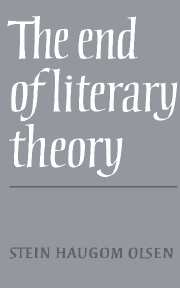Book contents
- Frontmatter
- Contents
- Preface
- Literary aesthetics and literary practice
- Interpretation and intention
- Authorial intention
- Text and meaning
- The ‘meaning’ of a literary work
- Defining a literary work
- What is poetics?
- On unilluminating criticism
- Criticism and appreciation
- Value-judgements in criticism
- Literature, fiction, and reality. A problematic relationship
- Thematic concepts: where philosophy meets literature
- Literary theory and literary aesthetics
- Notes
- Bibliography
- Index
Thematic concepts: where philosophy meets literature
Published online by Cambridge University Press: 05 November 2011
- Frontmatter
- Contents
- Preface
- Literary aesthetics and literary practice
- Interpretation and intention
- Authorial intention
- Text and meaning
- The ‘meaning’ of a literary work
- Defining a literary work
- What is poetics?
- On unilluminating criticism
- Criticism and appreciation
- Value-judgements in criticism
- Literature, fiction, and reality. A problematic relationship
- Thematic concepts: where philosophy meets literature
- Literary theory and literary aesthetics
- Notes
- Bibliography
- Index
Summary
ONE
In Euripides' Hippolytus, Phaedra, wife of Theseus, king of Athens, falls in love with the unsuspecting Hippolytus, Theseus' son by the Amazon Antiope. Phaedra's passion is the work of the goddess Aphrodite, who wants to revenge herself on Hippolytus because he has rejected her and devoted himself to the chaste Artemis. Through Phaedra's nurse, Hippolytus is made aware of her love and invited to her bed. He emphatically rejects her offer and violently abuses Phaedra and her nurse. To save her honour Phaedra commits suicide and leaves a note accusing Hippolytus of raping her. Theseus, confronted on his return from an expedition with the suicide and the note, banishes Hippolytus and prays to his father, the sea-god Poseidon, to fulfil one of the three wishes he has granted him and kill Hippolytus. Leaving Troezen, Hippolytus is killed when his horses are frightened by a monster thrown on shore by Poseidon from a giant wave. Theseus is brought to realize his mistake by the goddess Artemis who appears to him and reveals the truth. The play ends with the reconciliation of Theseus and the dying Hippolytus. This, in bare outline, is what happens in the play. It is what might be called its subject. The play is about these events and characters. Now, it is also possible to give another type of description of Euripides' play.
- Type
- Chapter
- Information
- The End of Literary Theory , pp. 176 - 195Publisher: Cambridge University PressPrint publication year: 1987



